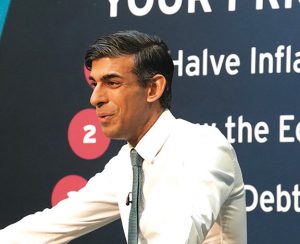Bloomberg
UK Prime Minister Rishi Sunak will look to begin closing a series of pay deals with trade unions, as the government enters 10 days of crunch talks ahead of coordinated strike action planned for early February.
Members of the Cabinet have told Sunak he must act fast to avoid a week of strikes that threaten to bring the country to a standstill, one minister said. Teachers, civil servants, train drivers and university staff will walk off the job on Feb. 1. Nurses and ambulance workers will strike again on Feb. 6, intensifying pressures on the teetering National Health Service.
Pay deals are close with rail workers and firefighters, a government official said. The hope was these agreements would have a domino effect, unlocking talks with other unions and resulting in a quick succession of deals, the minister said, with nurses ending up with a pay rise of about 9%. Union leaders have already lowered their initial demand for a 19% increase to about 10%.
However, a government official cautioned that rail negotiations are further along, and other sectors would take longer to resolve. Rail, Maritime and Transport Union boss Mick Lynch has privately been a more reasonable negotiator than some other unions, despite his public image as a left-wing firebrand, according to a person familiar, noting that this didn’t necessarily help ministers seeking deals with teachers and NHS workers.
“We have enormous respect and gratitude for all our public sector workers, especially those in the NHS,†Sunak said this week, adding: “We continue to want to engage constructively in dialog with them.†At the same time, the prime minister pressed the case for passing his government’s legislation, which would curb public-sector workers’ ability to strike by enforcing minimum safe staffing levels.
Royal College of Nursing chief Pat Cullen said this week that she had “extended an olive branch, in fact a whole tree, to the government,†calling on Sunak to meet the union “halfway.â€
 The Gulf Time Newspaper One of the finest business newspapers in the UAE brought to you by our professional writers and editors.
The Gulf Time Newspaper One of the finest business newspapers in the UAE brought to you by our professional writers and editors.
